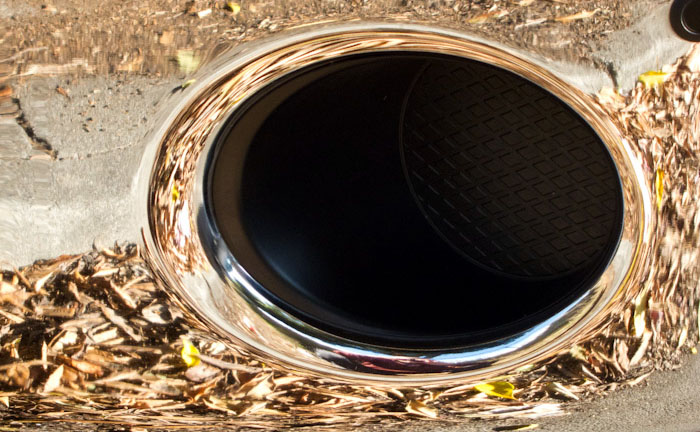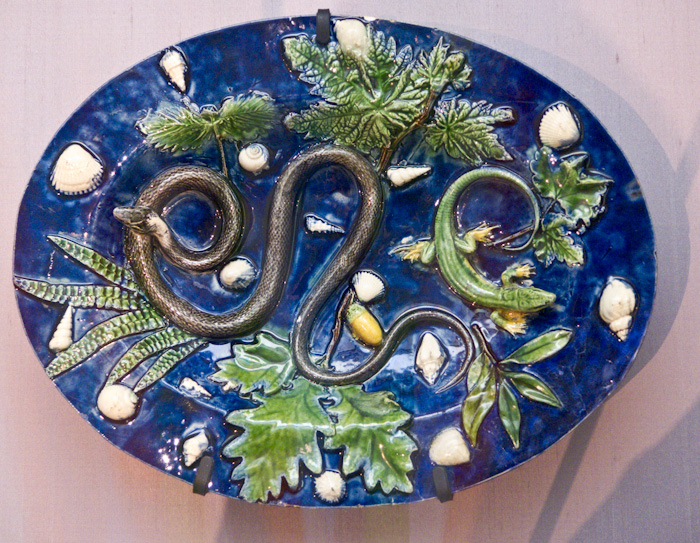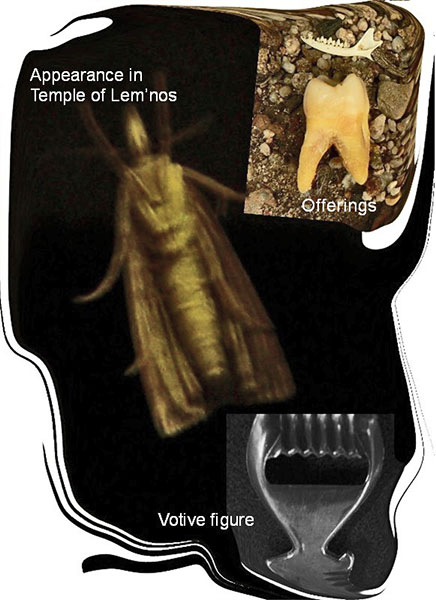
The Oyster and Alice O.
by Anna Tambour

Most agoraphobic oysters,
ever sweet and passive,
are torn from their homes
to slide down throats and die in gastric acid.
The lucky ones are fried in oil,
and die ever so quickly.
Others die on their opened house,
smothered in spinach, ickily.
Though one, it’s told
slipped, naked from the lips it was being borne to
and fell, its silvery slither lost amongst...
Delacillo’s was one of those restaurants people go to when they’ve got something better on their minds, and it was that time in the evening when the fug had reached its zenith: scents of crushed cat-glands and amber, bruised orange blossom and Bulgarian rose, aged tobacco tar, champagne dregs, powdered armpits, perfumed crotches, rich men’s anticipant breath, and the ozone of oysters by the bushel.
The band was playing something syncopated in competition with voices, glasses, dishes. It lost.
In this confusion, the oyster slipped away, with many reasons and absolutely no rhyme.
It fell upon the tablecloth, and recoiled at the harsh dryness. Seeking something familiar, the oyster leapt.
At that moment of the oyster’s leap, Charles Maginnis was in the act of leaning, and at the moment of the oyster’s landing just under the pearl necklace around the neck of Alice O., Mr. Maginnis’s lips met the oyster in what would have been a passionate smooch, but Charles Maginnis recoiled like a backside meeting a tack.
He looked at Alice’s tender neck, seeing only a champagne-tinted shimmer of pink and pearl. The girl looked alright, all right, but her flesh had tasted fishy. Well, not exactly fishy, as oyster isn’t fish, but Charles sluiced his mouth with his tongue and was disgusted. You never know about a girl. He’d downed a magnum of brut and two dozen tiger-makers on the half-shell this evening, planning for a wild-one of a night, but he expected her to smell like that Shalimar he’d bought her. Maybe she’d worn it for someone else. If so, he was gonna take these pearls, too. He couldn’t abide a woman with poor hygiene. “And that’s what perfume’s for, dammit. To drown their smell,” he said.
He reached towards her neck, not knowing if he was gonna kiss her again or choke her, or grab that necklace offa her—
Alice slipped sideways fast as clear soup off a fork, stood and walked out of Delicillo’s. She didn’t hear Charles Maginnis’s “Hey, you” and the crash of his chair as he lost his balance, nor the sodden-dufflebag thuds of him onto the floor— just jumbled percussives in the syncopated tings and crash of china, glass, slipping shoes on greasy fake marble, snared brass, brags, laughs, whines and variegated demands.
If something hadn’t saved her, she’d be in Charles Maginnis’s grasp, of that she knew. Oh, let’s not fret about that. She’d much preferred Charles Maginnis’s attentions to a trip to the dentist who had filled a molar just last week, but she’d had her fill of Charles, let alone his pearls and perfumes.
She shed a tear of frustration and one of pity.
“I’ve only got my brains and beauty,” she could have said, and it would have been true. She was so beautiful that men went silly for her, and a few had actually probably killed themselves for her, and not just tediously threatened. And she was smart. Really intelligent. And witty.
She was greedy, no buts about it.
She fingered her neck, and found the oyster. She wasn’t surprised.
Only something extraordinary could have stopped Charles Maginnis. He was a man of fierce passions, and when fuelled by champagne, oysters, and young beauty such as Alice O.’s, Maginnis was a man inclined to forget that some girls want a link in between a nice dinner in a fancy place and a bedroom afterwards—a little charm? Definitely yes, and no, if it means just more jewelry. Alice, for instance, would have…well, she would have made Charles Maginnis need no courage-makers, if he could have thought beyond pearls. Instead, she had needed to gracefully wrest his tongue from her neck in Delacillo’s before, and had resigned herself to the tedium again, when the oyster saved her.
It wasn’t that she was embarrassed. Delacillo’s, at this time of the evening (early morning) was a scene of anacondic tongues, cephalopodic limbs, and a common sensibility that descended upon the place every night in the fug itself, that everything that happened here, happened here in its own reality, broken only by the break of day and its lashings of chlorine bleach and elbow grease. So shame wasn’t a factor, but boredom was.
God, she was glad to get rid of that bore. For he wouldn’t have done, would he?
No, she admitted as she walked under a gentle rain.
When they got to her bedroom, she looked in the mirror. The oyster was nestled in the V of her throat muscles, its silvery sheen more complex and beautiful than the white glow of the pearls.
“You want to grant me three wishes?” she said.
“That’s rich,” said the oyster. “Who just saved whom?”
“Am I drunk?” said Alice, pulling down one eyelid.
“Of course you are,” said the oyster. “You owe me four wishes.”
“Four?”
“Three, then.”
Alice twiddled her fingers. “Three, then,” and fell onto the bed on her back.
The oyster slapped her. “You promised.”
“I promise,” said Alice. “Now let me sleep.”

Alice woke with the oyster on her neck beating to the low brass whahh whahhh of Billie Holiday singing “You can get it if you try,” backed up by the band music of the heater in the building’s basement chugging through the pipes of every radiator in the rooming house.
“Well, hello there,” said the oyster.
“Don’t be too sure,” said Alice, groaning.
“Look, beautiful,” said the oyster, stretching itself over two pearls in her strand. “I’ve been patient enough in my life.”
The necklace that Charles Maginnis had given Alice O., was what’s called a ‘collar’. The oyster squeezed its adductor muscle around the pearls ever so gently, turning the collar into a choker.
“Okay!” said Alice, sitting up. She rubbed her eyes.
“If you tell me your eyes feel gritty . . .” said the oyster, tensing.
“Alright already! I just need—”
“No you don’t!”
“What?”
“A prairie oyster,” said the oyster. “You were just about to say—”
Alice tossed her head in that imperious way women who make men threaten to kill themselves if they don’t get their way with them do.
“You don’t know me that well,” she said, and in those six muscular syllables, almost popped the pearls.
The oyster slipped, gripping frantically, but Alice’s skin was so smooth and the room so hot and slickening, the radiator pounding out a beat so hot that it was summertime all the time, else folks got colds down here.
Alice picked the oyster off the soft nest it had fallen on, something like seaweed, and she nestled it back in the V of her neck.
The oyster was silent, perhaps unusually so.
“They can’t take that away from me,” sang Billie.
“God,” said Alice. “Can’t get away from that woman anywhere in this town.”
“I like it,” said the oyster.
“Taste!” said Alice, but her eyes teared up. One drop rolled down her cheek, drew itself under the so-sure chin, followed the perfectly chiseled line of her throat, and spread upon the thirsting flesh of the oyster, a gorgeously salty wetness.
“What’s eating you,” asked the oyster, trying to sound tough, but really, in that instance, smitten with a strange feeling in its gut.
It must be said that the oyster had only a few days before, become a male or maybe a female, and maybe it had just changed back (in that could-be-said rather frivolous spontaneity that oysters take, with sex) at the touch of that woman’s fluid. The thing is, oysters are as sensual, though the crude would just say “sexual”, as any night on the town, though their wandering days are few, and only when they are extremely immature.
And this oyster had just realized that leading a sheltered life, never roaming to and fro like, say, jellyfish, limits a homebody’s experience. Never had the oyster learned of this magical fluid. Such lubricity, such salinity. Deliciously luxurious, irresistibly tasty. It wanted more.
“Do you all taste as good,” it asked.
“I guess,” said Alice, answering noncommittally automatically, a habit she’d fallen into. She was thinking of a strong bittersweet cup of chicory coffee, washed down with another cup of same. And two fried eggs, two slabs of toast, and a mountain of grits, its crater running with butter. Already, she’d put past her, what had made her want to break into great jags of sobbing, only a moment ago. Well, she was young, beautiful, and smart. Why wouldn’t she be forgetful?
And the oyster? How we judge them! As they say, “It’s always better to be stupid and uncultured.”
The ones we say are very good, irritate mighty easy; and though we’ve come to praise them, they meet the knife that pries them from their home before they learn the meaning of agoraphobic.

This oyster might have had naive taste in music, but it wasn’t stupid—and it was by personal nature, lascivious. Only yesterday morning, it had been quietly feeding when it was violently tilted, its home ripped from its very foundations, let alone neighborhood. And only last night, the oyster’s home had been broken into while it was supposedly healthily making some sort of a life in this uprooted abode piled just anyhow with so many others; and then the knife…Now it was impatient.
“Do that again,” said the oyster.
“What?” said Alice.
“Bathe me in your salty stuff.”
Alice blushed prettily, which made her break out in fresh perspiration.
This stuff was more concentrated, though very good. But there was too little of it.
“More of that other stuff,” ordered the oyster, gripping the necklace as Alice stood up.
“I’ve got to get bathed,” she said. “You can come with me.” She unclasped the necklace, but at the oyster’s scream, she clasped it again.
“You win,” she said. “But better not let Mrs. Davidson see us, or she’ll think I want milk in my bath.”
When they returned to Alice’s room, the oyster was still sputtering with indignation. It had been, oh!: lathered (“inadvertently!” Alice had insisted), dropped (when it slipped off its grip on the pearls) onto the enameled tin that was swimming with the foot funguses of one newspaperman, one divorced drugstore employee, and a girl who’d last been a girl fifty years ago; and almost sluiced down the drain, only to be pulled painfully, free. In that torrent of cascading water, Alice was too slick for the oyster to ride. That Alice had then perched the oyster in the soap dish thinking that that would do, created a scene that Alice had been obliged to sing over, to draw attention from, knowing that just across the hall, resided as if the house had been built around her, a Miss Fleeb, who was known in the rooming house, as Miss Enemy, (for Nothing Missed, Ever).
The oyster berated Alice so harshly (being itchy all over from that burning lathering stuff, so harsh, so quite unlike proper froth), that she sat stark naked on her bed, except for her pearl necklace and the oyster leaning on it jerking in little gasps from itchiness—and Alice began to cry.
She was hungry, confused, and feeling maybe a spot of guilt for half-wanting the oyster to have slipped down the drain, to oblivion.
She was unused to being properly berated. Cajoled, yes. Begged, oh my yes! Whined at, emotionally blackmail-tried. But out and out roundly chewed out till her ears were pink, not even in her dreams.
She cried and cried, and the more tears that fell, the more soothed the oyster became, though at first, the oyster only chewed her out more, as this was so wonderful that the oyster was worried lest she stop. But even when the oyster had been thoroughly cleaned of that toxic substance, and then clean, had bathed in it, turning its sleekly muscled body till its complex sheen of tarnished silver to light of the moon made the pearls look dull and pedestrian again—even then, more tears fell—enough now that the oyster tasted one, and savoured another, and then imbibed them slowly in its inimitably classy way.
No open mouth, no chewing noise. Just understated elegance. The oyster silently gorged itself, taking not just sustenance from the essence of Alice’s tears, but thrill—as the private sensualist aesthete it was. And after all that drinking to which it was not accustomed, the oyster tingled with feelings. Ones that had built up till they had to be satisfied one spectacular, draining night a year, on a month with no ‘r’ in it.
The tipsy oyster tottered on the hammock of pearls, and almost fell.
Alice blew her nose.
“So our feelings er mushual!” it cried. “Should I do eggs or sperm?”
Without waiting for Alice to answer, without even trying to line itself up to reach the tissue that Alice had blown into, the oyster released.
Call it rash. Call it rude. But please don’t say condemn it. Now the oyster was mortifiedly alert.
Alice wiped the milky substance from between her breasts.
“How many wishes have I granted you so far?” she said.
“I don’t know,” said the oyster. “I’m sorry to have taken liberties.”
“That’s quite all right. It was nothing…compared to—oh, hell,” she cried, and threw herself on the bed.
“Come, come,” said the oyster. “Tell me.”

The sight of Alice lit passions wherever she went, and all those whining men had cooled Alice’s sexuality till she felt as cold as a high-class fish market—until Charles Maginnis.
He ate to get sex, had a horrible habit of extruding his mouth parts all over Alice, and it is painful to state that ‘parts’ is no mistake. Mr. Maginnis’s teeth were large and white, but in the throes, what with his tongue and all (his eschewal of the prophylactic use of denture paste): floppy.
“But what an artist. You should see his line work,” Alice sighed, unconsciously drawing her finger lightly along the oyster’s back, making it shiver.
“His line work, you were saying.”
“Yes. Governor Gable’s nose. If only I could do that.” And she sighed again.
“So let me get this straight,” said the oyster. “You wish to be a political cartoonist, and he is the best in the country.”
“Oh, yes!”
“And you met up with him, hoping he could teach you.”
“Yes, the chump.”
“You or him?”
“Him, of course.”
The oyster reserved judgment, though about human emotions, it was learning so fast that it could be called an idiot savant, with a sensualist bottom note.
“And you actually fell in love with him,” it asked.
Alice blew her nose again, confusing the oyster who was still bamboozled by sinuses.
“Of course I fell in love with that big lunk,” said Alice. “ But if you’d seen that cartoon he did with the paper bags under the…and his caption!”
She broke into helpless laughter.
“You’re just as witty. I heard you last night, and now I understand some of it.”
“Of course I am, but I can’t draw.”
“Let’s have a look.”
“You promise to be honest?”
“I promise,” said the oyster solemnly.
“Hang on.”
The oyster swung from the pearls while Alice pulled a large tray out from under her bed. It was filled with loose sheets of paper. She rifled through them, and pulled one out. “This might be a bit too esoteric,” she said, timorously.
The oyster looked long and hard at the drawing.
“Of course, Randolph and Baggins aren’t in office anymore,” said Alice, “So the caption might not work with you.”
“Of course,” said the oyster, trying to think of something else to say. “These are humans?”
“No, they’re monsters!” said Alice, tossing her head
“Then this is an excellent portrayal.” said the oyster. “I’ve seen things back home that look much like them. Have you spent much time—”
“What,” said Alice, “are you talking about?”
“Your two monsters here. Your line work on their fins—”
“Those are ears, and I wasn’t trying there for caricature.”
The oyster fell silent.
Downstairs, a telephone rang.
“Damnation, I’m late,” Alice said, without moving a muscle.
“You can get it if you try,” Billie sang, with all the sensitivity of a recording.
Alice jumped up, threw open her door, yelled “Shut that lying woman up,” and slammed it.
Her chest was hot, her pearls shaking like the sea in a storm.
“Shhhh,” said the oyster. “ Shhhh, and sit.”
“Gotta get to work.”
“Nope, ya dope” said the oyster, who had learned much in the kitchen with the shuckers.
“You’re the boss,” Alice sniffed. “I just hope…Oh, I just hope…you see, I could… a bit of shade just here . . .”
She leaned over and picked up a stick of charcoal, hovering it over the cartoon.
“Hotsy-totsy, baby,” said the oyster. It had to make itself feel and sound upbeat, because of what it had to say.
“If my heart could only talk,” Billie sang, heartlessly.
For the truth of the matter was: at first, the oyster had been confused by Alice’s drawing, thinking it a scene of last night’s kitchen: two naked, helpless oysters lying on a table waiting to be thrown into a steaming pot. Now the oyster realized with its dim idiot savant mind that the pot was the State Capitol building, and the two oysters, not the State Attorney General and Treasurer portrayed satirically as two of the more obnoxious monsters of the deep, but Alice’s attempts at human renditions with a bit of extra emphasis to the nose, mouth, and jaws of the men.
“Alice,” said the oyster gently, but firmly. “Face it.”
“I must, mustn’t I?”
“I’m afraid so.”
“He didn’t teach me anything.”
“Those who do . . .”
“Oh, oyster!” cried Alice.
“You’re my egg-sprayer!” the oyster chortled. “Or do you wish to provide the sperm?”
“Eggs, dear. No matter what I wish,” said Alice, surprising the oyster. “And only one at a time.”
“We'll see about that,” replied the oyster, surprising Alice.
So the next month (“To hell with the 'r' in it!”) they wed by the light of the moon, and remain a couple. Where they are now, I can’t say, but their progeny favor bayous, bays, and bars, and are changing the world more than anyone can say—from the efflorescence of cartoonists that can’t draw, to the glut of poets with no reason and absolutely no rhyme.
Sometimes the oyster travels in the V of Alice’s neck, but more often, much more discretely, in a place that it calls home—as dark and wet as the oyster’s old neighborhood, but this has central heating, sustenance to sate a sybarite—and for a music lover, what rhythm!
About the Author

Anna Tambour moonlights as the Professor of Self-defence Eating at Oestrea State University. In her day job, she receives worshippers from many species when she isn't writing for them. Anthologies with her stories include The Del Rey Book of Science Fiction and Fantasy, Lovecraft Unbound, Sprawl, and Paper Cities. Her next story (on behalf of two prickly customers) will come out in October-- though however much power she wields as a deity, as an author she has sworn to an even Higher Power to keep the Where a mystery for now. Another story, "Marks and Coconuts", will be released by PS Publishing in their next Postscripts anthology.
Post a comment on this story!